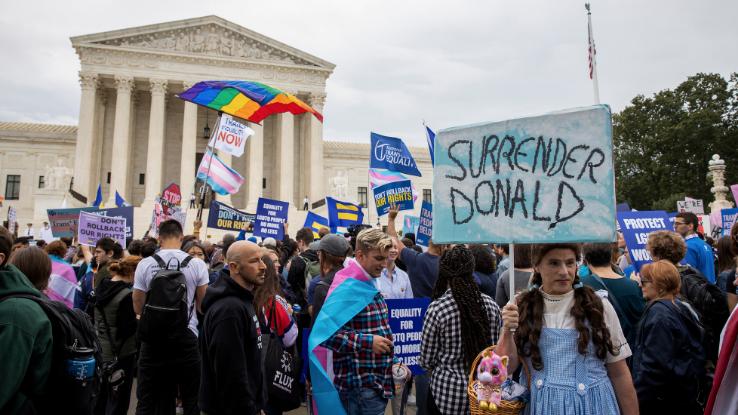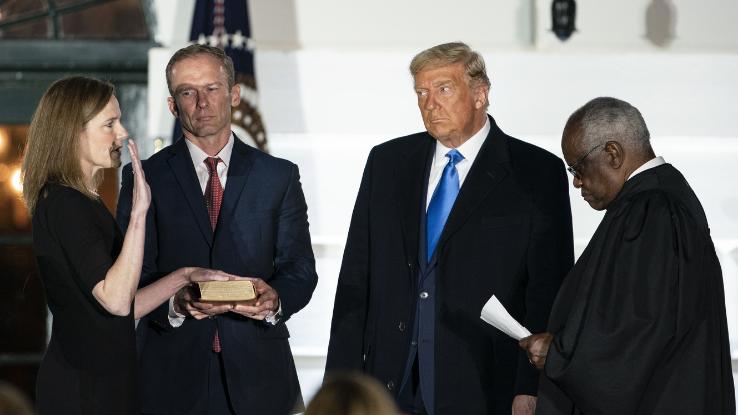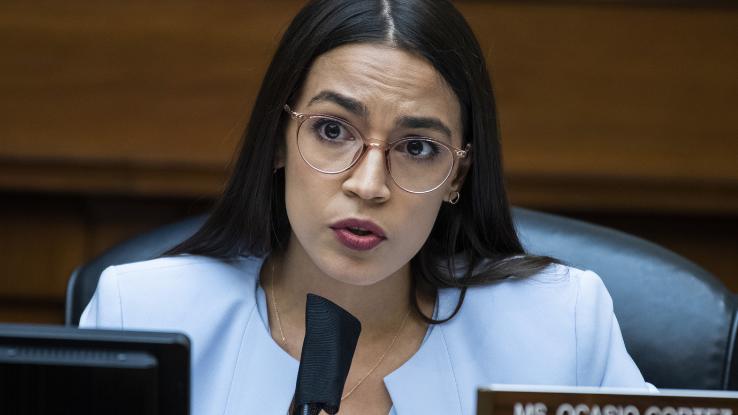Hillary Said New Supreme Court Justice Could Bring Back Slavery

When Justice Ruth Bader Ginsburg passed away on September 18, 2020, many Americans didn't take the proper time to grieve — instead, they panicked about what her passing meant for the future of the country. Holding the balance of an entire democracy is too great a burden for anyone's shoulders, and Justice Ginsburg had been carrying that weight for a long, long time. Instead of holding space for her passing, Republican politicians wasted no time in queuing up a nominee for the empty Supreme Court seat, eventually landing on Amy Coney Barrett — a longtime Notre Dame Law School professor who served fewer than three years on the Seventh Circuit before her nomination to the highest court in the American judicial system.
In 2016, then-Senate Majority Leader Mitch McConnell infamously vowed to block President Obama's outgoing Supreme Court nomination of Merrick Garland on the grounds that the American people should have a "voice" and that to rush a nomination (and confirmation) would be to overly politicize the issue. In 2020, however, McConnell didn't hold to those principles he outlined four years earlier, leading to Barrett's confirmation hearings and equally rushed swearing in ceremony, which took place about a week before Election Day on October 26, 2020.
This move led many to criticize McConnell, including New York Representative Alexandria Ocasio-Cortez (@AOC), who simply tweeted, "Expand the court." Additionally, Massachusetts Senator Ed Markey (@EdMarkey), who is Ocasio-Cortez's Green New Deal co-author, tweeted, "Mitch McConnell set the precedent. No Supreme Court vacancies filled in an election year. If he violates it, when Democrats control the Senate in the next Congress, we must abolish the filibuster and expand the Supreme Court."
The Number of Supreme Court Seats Has Been Adjusted Before — Here's How It's Done
This call for a SCOTUS expansion has led many to wonder: Is such a move even possible? The short answer: yes. Congress could easily change the number of seats on the Supreme Court bench. According to the Supreme Court's website, "The Constitution places the power to determine the number of Justices in the hands of Congress" — just another example of those supposed checks and balances that guide a constitutional government. In fact, the number of Justices has shifted several times throughout the Court's history. In 1789, the first Judiciary Act set the number of Justices at six; during the Civil War, the number of seats went up to nine and then briefly 10; and, once President Andrew Johnson took office, Congress passed the Judicial Circuits Act in 1866, cutting the number of Justices to seven so that Johnson couldn't stack the court in favor of Southern states.

Since 1869, however, the Supreme Court has been composed of nine Justices. In semi-recent history, there's been one notable attempt to expand the Court — one that will live in infamy, so to speak. Back in 1937, President Franklin Delano Roosevelt aimed to expand the Court, which kept shooting down some of his New Deal legislation. More specifically, FDR felt that many of the older Justices were out of touch with the times, so much so that they were colloquially dubbed the "nine old men."
FDR's proposal? Add one Justice to the Supreme Court for every 70-year-old Justice residing on the bench. That would've resulted in 15 Supreme Court Justices, but even the Democrat-controlled Congress — and FDR's own Vice President — were against the idea. Since FDR's infamous defeat, no attempt to expand or reduce the Supreme Court has gathered much steam — until now.
Interestingly enough, Politico points out that President Biden has been outspoken about not expanding the court. In 2019, President Biden even went as far as saying "we'll live to rue that day [we expand the Court]," arguing that an expansion would lead to constant changes — more expansions, more reductions. In short, it would shake the American people's faith in the legitimacy of the Supreme Court (and potentially the Democratic party). Of course, that's just one scenario — and one that hasn't happened in the past. But, in the past, Vice President Kamala Harris has shown some support for the idea, saying she'd be "open" to it. However, both Vice President Harris and President Biden have also dodged questions surrounding court-packing and Supreme Court expansion.

On the other hand, more outspoken proponents have tried to gather momentum for the idea. Representative Ocasio-Cortez expanded upon her initial "Expand the Court" tweet, calling out Republicans' hypocrisy toward appointing new Justices during presidential election years. "Republicans do this because they don't believe Dems have the stones to play hardball like they do. And for a long time they've been correct," Ocasio-Cortez tweeted. "But do not let them bully the public into thinking their bulldozing is normal but a response isn't. There is a legal process for expansion."
In the face of a 6–3 Conservative majority, folks like Representative Ocasio-Cortez argue that the Supreme Court is out of balance — and, more than that, it isn't quite reflective of the American people's concerns and values. So much lies in the hands of the court: the fate of the Affordable Care Act, Roe v. Wade and marriage equality, just to name a few. Now, we'll just have to see if this imbalance — and Barrett's speedy appointment — are enough to convince President Biden and members of Congress to seriously consider a Supreme Court expansion.
MORE FROM ASK.COM
Hillary Said New Supreme Court Justice Could Bring Back Slavery
Source: https://www.ask.com/culture/ask-answers-expand-supreme-court?utm_content=params%3Ao%3D740004%26ad%3DdirN%26qo%3DserpIndex
0 Response to "Hillary Said New Supreme Court Justice Could Bring Back Slavery"
Post a Comment